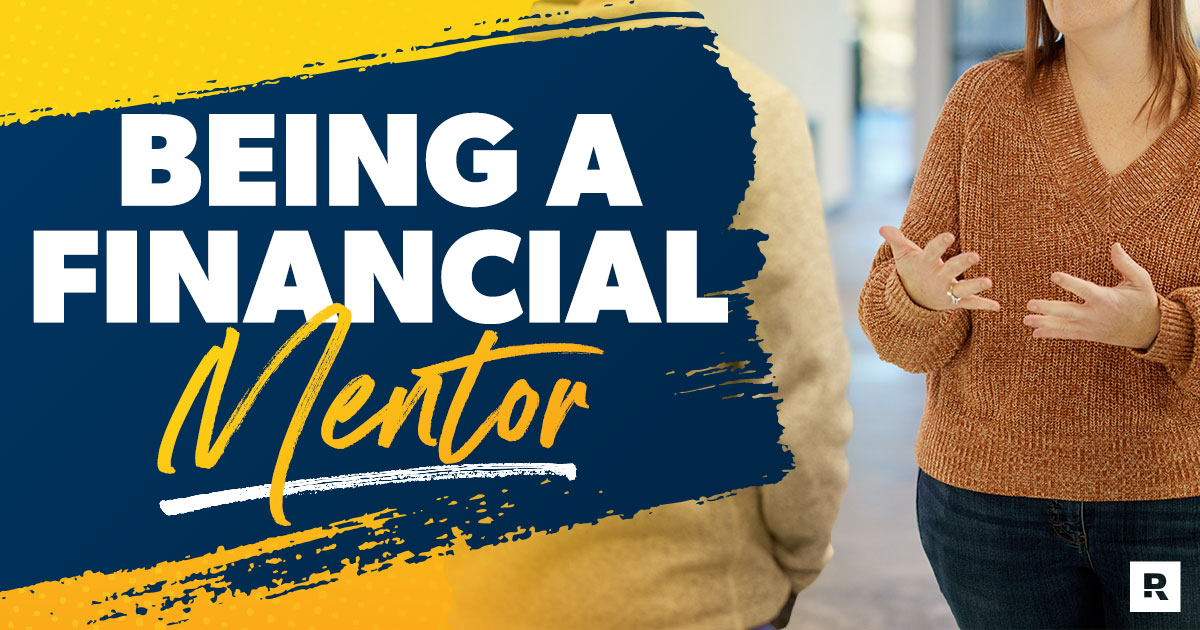
When you experience the freedom and joy that comes from winning with money, you’ll naturally talk about it. You’ll want to pass along what you’ve learned, especially when you know you can help the people you care about. But before you put on that teacher’s hat, you need to decide what mentoring means for you.
What Does Financial Mentoring Look Like?
There are four basic levels of being a financial mentor, each with a different degree of commitment for you and the person you’re mentoring.
How you decide to mentor and the topics you cover are up to you, but don’t dismiss mentoring relationships because you don’t feel like you know enough. You don’t have to be perfect to teach others. Instead, just be honest about your successes and failures and be open to sharing what you’ve learned from your mistakes.
4 Tips for Being a Financial Mentor
If you’ve never been a financial mentor—or any kind of mentor for that matter—you may feel overwhelmed and intimidated by the idea. Relax. You can do this!
Here’s something that might relieve some pressure: It’s a good idea to be mentored while you’re mentoring someone else. There’s always more to learn, and your mentor can act as a sounding board when you have questions about your mentee.
The most important thing to remember, though, is that people respond when you empower and encourage them. That’s something you can do for everyone.
Also, if you are interested in becoming a financial coach, check out Ramsey Solution’s Financial Coach Master Training.
- Modeling: This is the most informal type of mentoring, and you’re probably doing it already. Whether or not you realize it, people observe how you spend (or save) your money. They see that you bring your lunch instead of going out every day. They’ve heard you joke about something not being in the budget. They notice that you don’t buy a bunch of stuff you don’t need to impress people you don’t like. Usually, people will observe you before they ask you for help.
- Educating: This kind of conversation sounds like: Hey! What was that app you were talking about—the one that tracks your expenses? or Why do you always pay cash? As your example takes hold, you will begin to get questions. You may also offer helpful information by posting on social media, sending someone a link to an article, or lending a book. This level of mentoring is more structured than modeling, but it still doesn’t require a measurable investment of your time.
- Developing skills: Some people need more than knowledge. They need to learn basic skills like how to do a monthly budget, how to opt in to a workplace 401(k), or how to set up a will. Obviously, this will require more of your time and energy. If you don’t have the time to help the person directly, you could help find someone who can offer the direction they need.
- Providing accountability: This stage involves the other degrees of mentoring, but takes participation and commitment up a notch—both for the mentor and the mentee. When you agree to hold someone accountable, you’re willing to ask the tough questions and challenge a person to change their behavior. It’s a more intimate relationship—one that requires you to handle their miscues with grace while guiding them to choose better in the future.
- Talk about expectations up front. If a person asks you to help them get on solid financial ground, find out what they’re looking for. Ask questions like: What would you like to learn about? How would you like to learn about this? and What would success look like for you? These questions give the person the opportunity to clarify their goals, and they give you the chance to assess whether or not you have the skills and knowledge to help.
- Show compassion and grace. Do you remember when you were first learning the financial principles that changed your life and your future? At that turning point, you were probably making lots of poor choices. Remembering those mistakes can give you compassion and grace for people who are in that same boat now. Talking with someone about finances feels scary and vulnerable, so when a coworker or friend asks for advice, don’t shame or judge. Instead, let them know you’ve been there. Talk openly about the mistakes you’ve made and what you learned. And always, always give them hope.
- Have the uncomfortable conversations. When someone asks for your input, you need to be honest. Debt is always a bad idea. Hiding finances from a spouse is a really bad idea too. Don’t shy away from those difficult discussions. You’re not helping the person who came to you for guidance. They may not like what you have to say, but that’s okay. Eventually, they’ll be grateful for your truthfulness.
- Keep learning. You can always learn more about finances and money. Whether it’s the latest IRS laws or a great app for budgeting, there’s always something new to add to your tool chest for financial success.
How to Grow as a Financial Mentor
Now, we’re not telling you to go back to college for your master’s degree in finance, but listening to podcasts and news stories could be helpful along the way. You never know when that nugget of truth will come in handy! Check out The Ramsey Show, where we take calls every single day from people across the country and offer practical advice on money.


